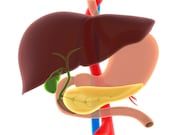Cyst classifier test is based on clinical and imaging features, genetic and biochemical markers
THURSDAY, July 18, 2019 (HealthDay News) — A comprehensive test is more accurate than conventional clinical and imaging criteria for identifying precancerous pancreatic cysts, according to a study published online July 17 in Science Translational Medicine.
Simeon Springer, Ph.D., from Johns Hopkins University in Baltimore, and colleagues used supervised machine learning techniques to develop a comprehensive test, CompCyst, to guide management of pancreatic cysts. The test was based on clinical and imaging features and cyst fluid genetic and biochemical markers. Using data from 436 patients with pancreatic cysts, CompCyst was trained to classify patients as those requiring surgery, those who should be routinely monitored, and those who did not require further surveillance. CompCyst was then tested in an independent cohort of 426 patients, compared with the gold standard of histopathology.
The researchers found that clinical management informed by the CompCyst was more accurate than that based on conventional clinical and imaging criteria alone. In more than half of patients who underwent unnecessary resection of their cysts, application of CompCyst would have spared surgery.
“CompCyst does not replace conventional clinical tools. Instead, it contributes additional information, allowing clinicians to make more informed decisions,” the authors write. “How and when tests like CompCyst can be implemented in routine clinical settings remains to be determined.”
Several authors are founders or disclosed ties to Personal Genome Diagnostics and PapGene; several authors disclosed additional ties to biopharmaceutical companies.
Copyright © 2019 HealthDay. All rights reserved.








